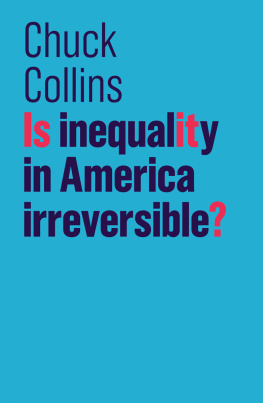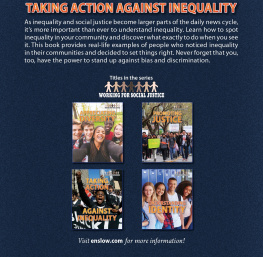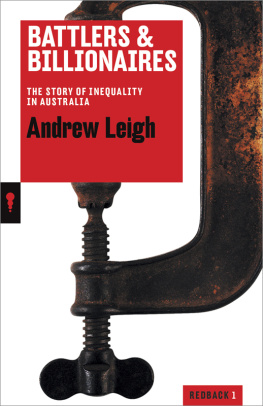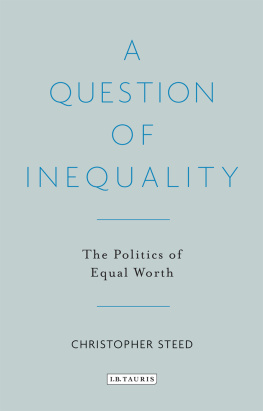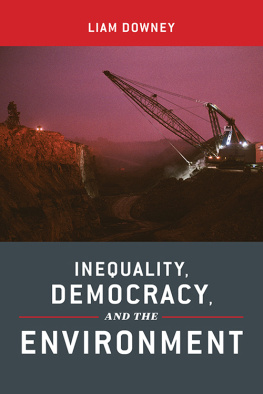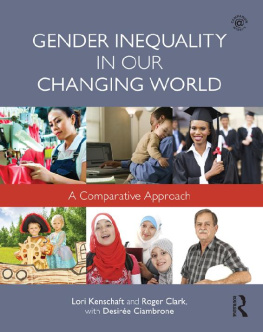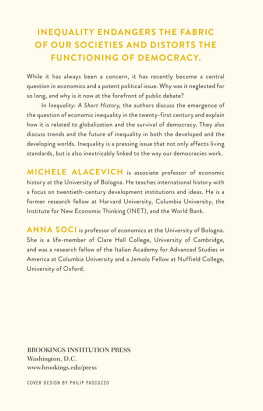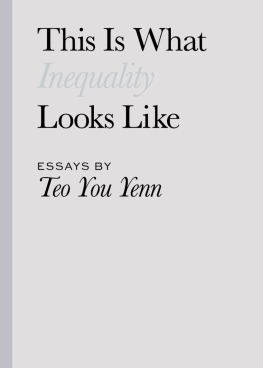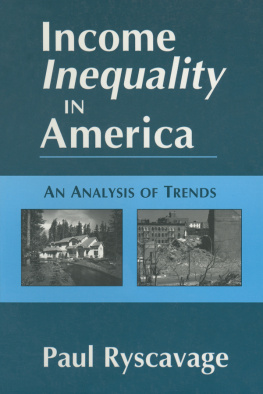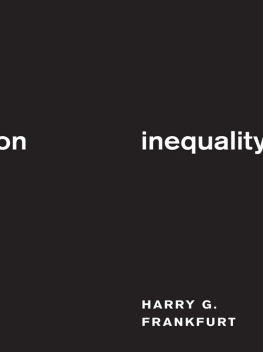Contents
Guide
Pages

The Future of Capitalism series
Steve Keen, Can We Avoid Another Financial Crisis?
Ann Lee, Will Chinas Economy Collapse?
Danny Dorling, Do We Need Economic Inequality?
Malcolm Sawyer, Can the Euro be Saved?
Chuck Collins, Is Inequality in America Irreversible?
Is Inequality in America Irreversible?
Chuck Collins
polity
Copyright Chuck Collins 2018
The right of Chuck Collins to be identified as Author of this Work has been asserted in accordance with the UK Copyright, Designs and Patents Act 1988.
First published in 2018 by Polity Press
Polity Press
65 Bridge Street
Cambridge CB2 1UR, UK
Polity Press
101 Station Landing
Suite 300
Medford, MA 02155, USA
All rights reserved. Except for the quotation of short passages for the purpose of criticism and review, no part of this publication may be reproduced, stored in a retrieval system or transmitted, in any form or by any means, electronic, mechanical, photocopying, recording or otherwise, without the prior permission of the publisher.
ISBN-13: 978-1-5095-2254-5
Library of Congress Cataloging-in-Publication Data
Names: Collins, Chuck, 1959- author.
Title: Is inequality in America irreversible? / Chuck Collins.
Description: Malden, MA : Polity Press, [2018] | Series: The future of capitalism | Includes bibliographical references and index.
Identifiers: LCCN 2017045295 (print) | LCCN 2017048494 (ebook) | ISBN 9781509522545 (Epub) | ISBN 9781509522507 (hardback) | ISBN 9781509522514 (pbk.)
Subjects: LCSH: Income distribution--United States. | Poor--United States. | Wealth--United States. | Equality--United States.
Classification: LCC HC110.I5 (ebook) | LCC HC110.I5 C5866 2018 (print) | DDC 339.2/20973--dc23
LC record available at https://lccn.loc.gov/2017045295
The publisher has used its best endeavours to ensure that the URLs for external websites referred to in this book are correct and active at the time of going to press. However, the publisher has no responsibility for the websites and can make no guarantee that a site will remain live or that the content is or will remain appropriate.
Every effort has been made to trace all copyright holders, but if any have been inadvertently overlooked the publisher will be pleased to include any necessary credits in any subsequent reprint or edition.
For further information on Polity, visit our website:
politybooks.com
Acknowledgments
I am most grateful to my colleagues at the Institute for Policy Studies and our Program on Inequality and Inequality.org team especially Sarah Anderson, John Cavanagh, Josh Hoxie, Bob Lord, Anny Martinez, Jessicah Pierre, Sam Pizzigati, and Basav Sen.
Throughout this book are citations from and attributions to a wide community of scholars, researchers, analysts, agitators, and organizers. My gratitude is expressed, in part, through these footnotes. A special thanks to Brooke Harrington for her work on hidden wealth. S.M. Mike Miller has been an important mentor over the years.
Many thanks to the team at Polity, especially George Owers. Thanks also to readers, including Colin Gordon.
This book is dedicated to all those who work each day for an equitable and just society.
Introduction
A Front Row Seat to Inequality
I grew up in an affluent family in the wealthy Detroit suburb of Bloomfield Hills, Michigan. I attended an elite boys school, played tennis and golf at a private country club, and didnt worry for much. Though growing up in the 1 percent, my parents had a strong sense of fairness and community responsibility.
At age 26, I had a job working with tenants in mobile home parks who were struggling to buy their mobile parks as cooperatives. In the process, I personally analyzed the private financial information of hundreds of low-income individuals in order to assess the feasibility of a resident-purchase.
By the mid-1980s, real wages for the bottom half of income earners in the population were starting to stagnate or decline. Because of my job, being privy to the financial secrets of many working-class and low-income Americans, I could see at first hand the impact of declining wages. I saw how people stretched and struggled to pay their bills, from working more hours, putting more family members into the paid labor force, and taking on debt.
Because of my advantaged upbringing, I was also witness to the wealth-creating-wealth phenomenon at the top end of the ladder. I personally saw the value of wealth given to me double over a five-year period. All around me people were celebrating their appreciating real estate and financial investment assets.
In the 1990s, when I started to read about inequality trends, these were not abstract numbers on a page. I could recall the faces and stories of people at both ends of the US economic experience.
* * *
We are living in a time of extreme and extraordinary inequality. There is now a genre of research looking at different dimensions of the income and wealth gap. This body of work chronicles the shapes and facets of inequality and its adverse impact on everything we care about. I myself have written a few of these books, and have documented this growing body of analysis from my perch as coeditor of the web portal, Inequality.org.
This slim volume will intentionally not linger on the problems caused by inequality, but instead will focus on the pathways to reversing these inequalities. This introduction will provide an overview of changes in income, assets, and the racial dimensions of economic inequality.
The primary focus of this analysis will be on the US economy and its particular systemic inequalities of income, wealth, power, and opportunity. While US inequality is part of a global trend, the condition is more acute due to the nature of hyperindividualistic capitalism and public policy in this country.
examines the drivers of these inequalities and the debates as to their relevance. This discussion will go beyond the simplistic theory that they are driven by technological change and globalization, though these forces have contributed to the gap. These inequalities have their roots in rule changes in the economy, the result of imbalances of power and agency.
, of transformative campaigns.
The bulk of the book, after , is focused on the remedies and interventions required to shift the current US trajectory toward deeper inequalities and reverse them. This will draw from the US historical experience of reversing the staggering inequalities of the first Gilded Age that emerged between 1880 and 1915. I will also draw lessons from social democracies that operate in the same global capitalist framework as the US but have considerably less inequality.
For ecological reasons, however, we cannot simply repeat the same playbook from the past, such as the policies that created the post-World War Two period of shared prosperity. Ecological limits to growth will constrain our ability to reduce inequality with a revival of carbon extraction and burning. As we face the realities of climate change and the breaching of other ecological planetary boundaries such as declining fresh water and soil fertility alongside ocean acidification a program to reduce inequality will have to operate within the constraints of a finite planet.
The discussion of policy interventions to reverse inequality will utilize a framework suggested by sociologist S.M. Miller. He clusters policy solutions into three sometimes overlapping categories: raising the floor, leveling the playing field, and reducing concentrations of wealth and power. will survey solutions that reduce the concentration of wealth and power, including taxing the wealthy and instituting anti-trust provisions in order to break up corporate monopolies.

